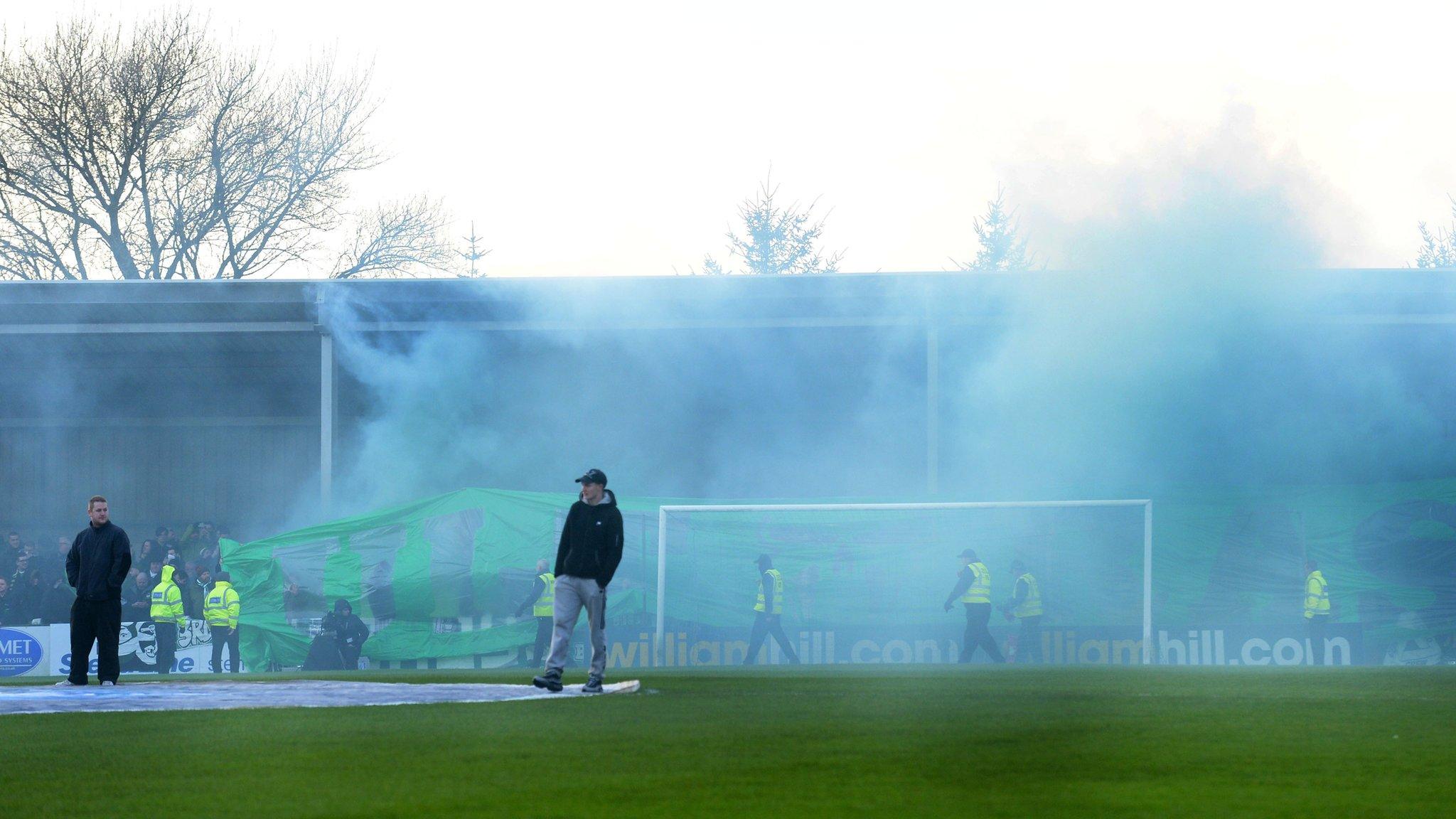Flares and smoke bombs: The ugly side of the beautiful game
- Published
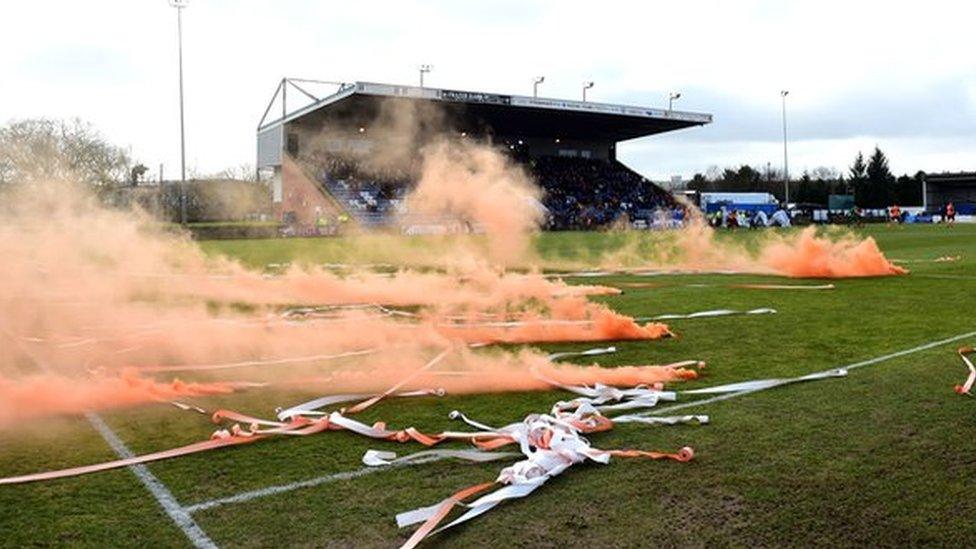
The SPFL is concerned by the use of smoke bombs and flares at matches
Setting off smoke bombs and flares at football stadiums has long been a feature in mainland Europe and South America.
And they are becoming a more common sight in Scotland.
Assistant Chief Constable Bernard Higgins told BBC Scotland earlier this month that in the season so far there have been 32 incidents of pyrotechnics or flares being thrown.
He said the trend posed a "real danger".
"Somebody is going to get hurt. We've had a couple of real near misses, but it is potentially really quite life threatening," warned Mr Higgins.
Somebody is going to get hurt. We've had a couple of real near misses, but it is potentially really quite life threatening."
Two notable incidents took place earlier this month....
and another at the Stranraer versus Celtic Scottish Cup match
But why are the police in Scotland seeing more cases?
Well, the flares can be easily bought online; they are marketed as legal and they are relatively cheap - typically you can buy five for 11 Euros.
The catch for fans is it's against the law to enter a football ground carrying fireworks, flares, or any sort of pyrotechnics, and anyone doing so faces three months in jail.
As early as February 2011, Strathclyde Police were warning people not to use them

What's the intended use for flares and smoke bombs?
Flares are used for marine distress
They are designed not to be extinguished easily or quickly.
They contain chemicals
And can burn at temperatures of 1600°C - the melting point of steel.
Smoke bombs are mainly used recreationally in paintballing and war games
They also burn at high temperatures
They are designed to be used in wide open spaces.
And they are dangerous for those who suffer from asthma

In England, the Premier League, Football League and FA launched a supporter education campaign on the danger of pyrotechnics at football grounds and the Scottish Football Association embarked on a similar campaign last year, "Flair not Flares".
A man whose father was killed by a flare at an international football match 23 years ago believes "nothing has been learned" from the tragedy.
John Hill, 67, died after being hit by a marine distress flare at the end of an international game in Cardiff in 1993.
Deaths from flares
Two men later admitted manslaughter and were jailed. Mr Hill's son, also John, condemned the current trend of throwing flares and smoke canisters on to football pitches.
But Mr Hill's death wasn't the first and is unlikely to be the last.....
1992 - Guillem Lazaro, a 13-year-old Spanish boy, was killed when he was hit in the chest by a flare at a stadium in Barcelona
2013 - a 14-year-old boy died in Brazil from a flare which was thrown at a Corinthians game
2015 - the Russia goalkeeper Igor Akinfeev was struck on the back of the head with a flare during a match between Montenegro and Russia.
In Scotland, the problem is not confined to one club. Hibs, Queen of the South, Motherwell, Morton, St Mirren, and Cowdenbeath, have all had flares on their pitches.
Celtic have "indefinitely suspended" two fans from attending matches home and away after the use of flares inside Fenerbahce's stadium in Istanbul last December.
The club have also launched their own investigation ahead of Uefa making a decision on 18 February about the flares which were set off in Turkey during the Europa League game.
So, what could be done?
Scottish football chiefs have overwhelmingly opposed the idea of introducing new strict liability rules whereby a club is punished for the behaviour of their supporters, either through financial fines or by having points deducted.
Paul Brennan is a Celtic fan and blogger with Celtic Quick News.
He told BBC Scotland earlier this month: "Celtic had a lot of publicity for flares at the weekend, and I was appalled at the use of flares.
"Ross County had flares several days before that, but that wasn't covered in the news.
"That's part of the consequence of larger clubs getting a whole lot more media coverage and a whole lot more people watching them but it's certainly not a problem that's limited to one or two clubs."
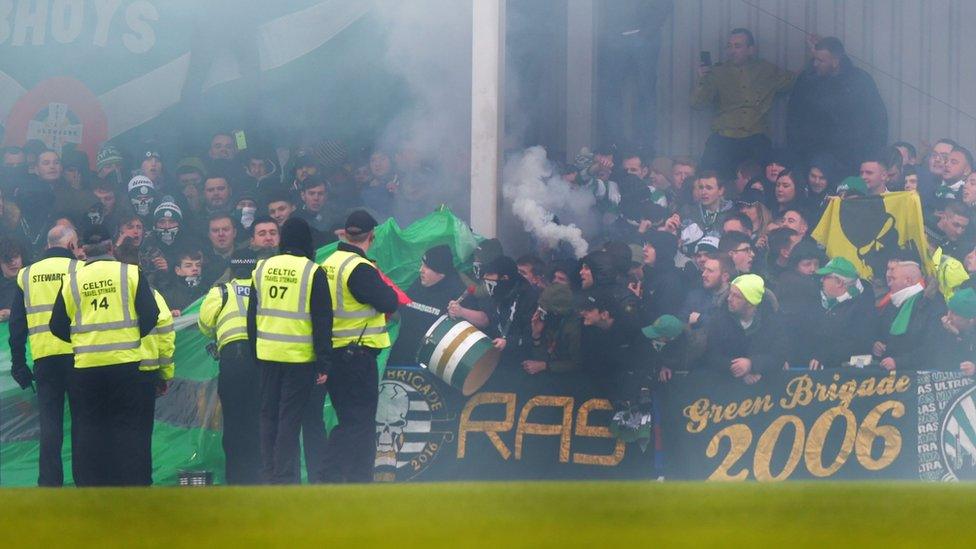
Flares were set off at a recent match between Stranraer and Celtic
Mike Barile is on the board of Dundee United supporters group, the Arab Trust, and thinks harsh penalties on clubs is needed.
He said: "I think the sooner we get to the stage where the clubs involved are penalised, not by fines, but by deducting points or eliminating them from competitions, then you will see a huge reduction take place in all kinds of offensive behaviour.
"Decent fans will then self-regulate their own fans."
However, Mr Brennan isn't convinced that will work and voices worries about who will decide who gets points deducted.
Nevertheless, as long as a minority of supporters engages in anti-social behaviour, it's a problem for the police service.
'Eradicate from the game'
So, what is the big attraction for fans?
Dr Joe Bradley is a senior lecturer in sports studies at Stirling University.
He said: "In terms of atmosphere, theatre and togetherness, singing, banners and flags significantly contribute to football as a spectator sport. Indeed, they are intrinsic to that side of the modern games' survival.
"Certain types of pyrotechnics can quite clearly be seen in such a context.
"Flares recently used at some football matches in Scotland are in the dangerous category and these are the ones football authorities, police and football clubs are morally obliged to eradicate from the game."
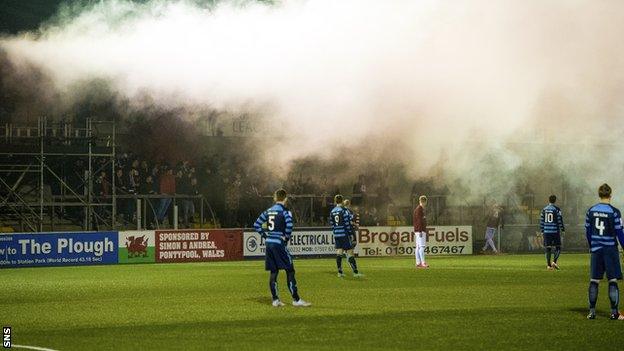
Smoke bombs were let off during Forfar Athletic's abandoned Scottish Cup tie with Linlithgow Rose
Former SFA and Fifa referee, John Rowbotham, said that from a referee's point of view, flares are extremely dangerous.
He explained: "If you are setting off pyrotechnics in a large crowd you are endangering all the people around you.
"I've seen it happening abroad. In Greece once, I think it was 2000, a flare was thrown on to the park and an assistant and a player fell to the ground with the shock, the noise of the bang.
"Around 1998 at a game in Budapest, the local police officer was keen to show me items confiscated from fans, including many flares."
The Scottish FA and SPFL said a multi-agency approach was key to tackling the problem.
'Isolated incidents'
In a joint statement they said the use of flares is extremely dangerous and that there was a growing and "fashionable" trend of pyrotechnic use across Europe.
But they insisted that the use of flares was not a regular occurrence in the Scottish game
Their statement added: "Unfortunately we have experienced a very small number of isolated incidents over recent seasons.
"When you understand the damage and life-threatening potential of flares, which the police have shown us the evidence of, it is imperative we crack down on this irresponsible and incredibly dangerous behaviour and help eradicate it from the sport.
"We want all Scottish football crowds to be able to enjoy games safely, and maintain their reputation as some of the best fans in the world, but the safety of fellow supporters, match officials and players is paramount and anything which puts that at risk is completely unacceptable."
- Attribution
- Published3 December 2013
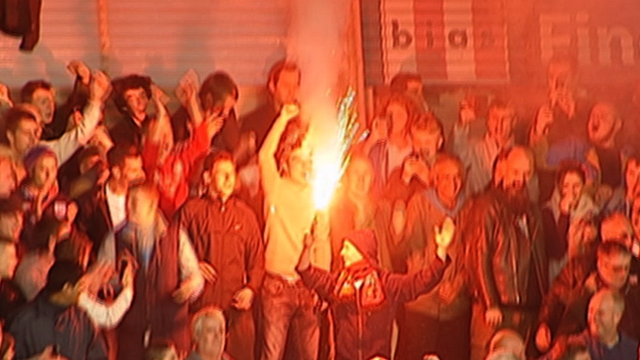
- Published3 December 2013
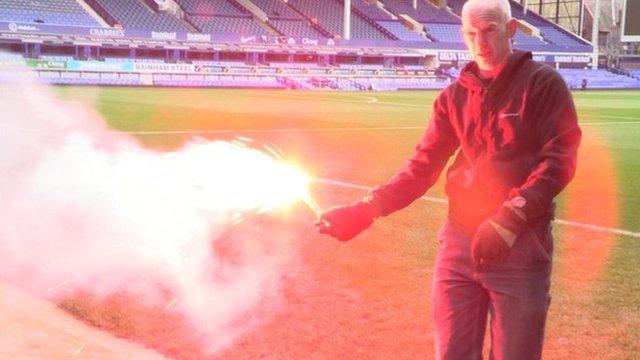
- Attribution
- Published12 January 2016
